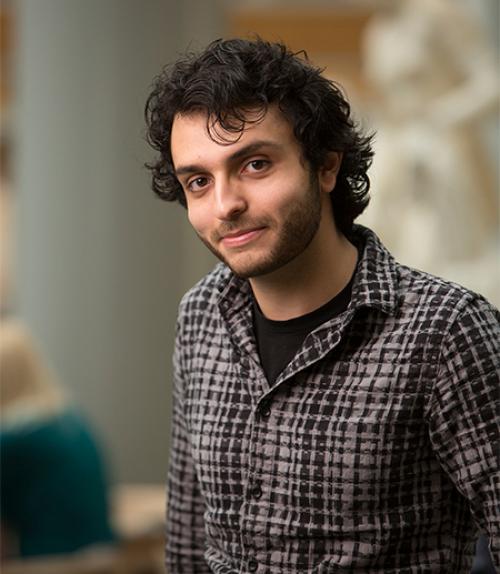Amin Nikbin
Linguistics & Philosophy
Richmond Hill, Ontario
What accomplishments/activities are you most proud of while at Cornell?
Academically, I'm most proud of being inducted to Phi Beta Kappa, and of the diversity of departments I've seriously engaged with. Studying as an interdisciplinary student has been enlightening in ways I could never have imagined, coming from a heavily science-oriented background. But more than this, I'm proud of my work as a teacher, and of how much I've learnt from teaching students. I began as a consultant for our Introduction to Python, trying to ease the often traumatic first-encounter that people have with computer code. Then, this past summer, I assisted an Introduction to pre-calculus for our incoming freshman. This was one of the most demanding and rewarding experiences I've had here; holding extended office hours past midnight on the day before their final exam is a memory I won't easily forget. I've discovered through all this that one often finds oneself learning from those one is supposed to be helping. That's why I've come to love teaching, and why I intend to return to it in the future.
How did any of your beliefs or interests change during your time at Cornell?
Perhaps most significantly, I changed majors multiple times: from physics and philosophy to math and philosophy to linguistics and philosophy (with a minor in math). This was primarily due to a sense of frustration with fields where a great deal of preparation was required before one could hope to make the smallest genuine contribution. Linguistics is still a nascent subject, and philosophy is defined by a frontier, so I found myself attracted by the prospect of original productivity. As for my beliefs...
Through mental manipulation of the best kind, Derk Pereboom converted me from an ideological believer in free will to a thoroughbred free-will skeptic – no regrets!
Will Starr pulled me out from the murky depths of Cartesian substance dualism, and since then I've come to realize that I could definitely be friends with a robot.
Severine Hex identified for me the disease of anthropocentrism that's endemic to practically every field of study. I now consider myself heavily immunized.
I spent about three years of my undergraduate career as a dogmatic empiricist. I then reread Nietzsche and overdosed on radical skepticism. I'm now a recovering nihilist, living out my days in the wonders of existentialism.
After four years I still think in metric, however. I don't think that's ever going to change.
What are your plans for next year; where do you see yourself in 10 years?
I'll be starting as a graduate student in philosophy at UCLA this coming fall; the department there is practically a perfect fit for my research interests, and their interdisciplinary research movement between philosophy, linguistics, psychology and much more, is a rich web of projects that I'm eager to engage with. Ten years from now, should all go well, I hope to have found academic appointment as a research professor. My dream is to read, write, think and speak to others who do the same for a living. And to have a pet rabbit. What more could I ask for?
Anything you'd like to add about yourself that these questions didn't address?
None of this would have been possible without my parents.




